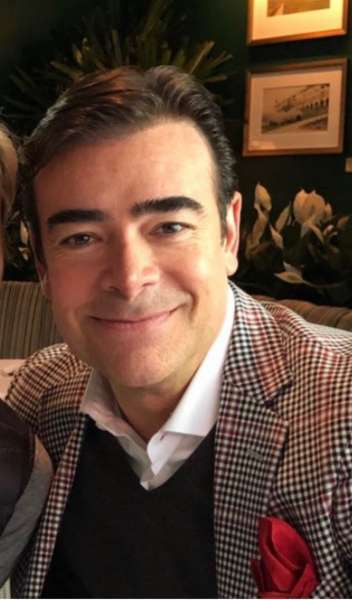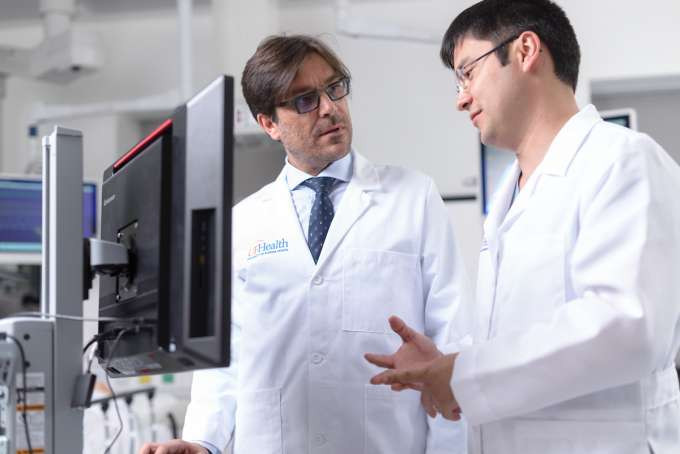Mexican Actor and singer Toño Mauri has undergone a successful lung transplant at UF Health Shands Hospital after suffering severe and permanent lung damage from COVID-19. His journey highlights the serious long-term consequences of the virus for some individuals and the life-saving potential of organ transplantation.
Mauri’s battle with COVID-19 began in June, leading to hospitalization and ultimately necessitating a lung transplant as his only path to recovery. Like many others who have survived severe cases of COVID-19, Mauri faced the devastating reality of irreversible lung damage.
 Antonio Mauri headshot for article about lung transplant
Antonio Mauri headshot for article about lung transplant
“We are seeing an increasing number of patients who have fought hard against COVID-19 but are left with significant lung damage,” explained Dr. Tiago Machuca, chief of thoracic surgery and surgical director of the lung transplant program at UF Health. For Mauri, a lung transplant became essential after months of battling the virus’s aftereffects.
Upon arriving at UF Health, Mauri had been struggling with the complications of COVID-19 for five months. His treatment history included mechanical ventilation, a tracheotomy, and 44 days on ECMO (extracorporeal membrane oxygenation), as Dr. Machuca detailed. Even after being weaned off ECMO, Mauri remained heavily reliant on mechanical ventilation to maintain adequate oxygen levels.
Dr. Machuca noted the rarity of complete lung recovery after such a prolonged and severe illness. By the time he evaluated Mauri, the Mexican actor showed clear indications of advanced chronic lung disease. “At that point, it became unlikely that he would be able to breathe independently without the ventilator,” Dr. Machuca stated, underscoring the urgency of Mauri’s situation.
The lung transplant team at UF Health acted swiftly upon Mauri’s arrival on November 25th. Dr. Andres Pelaez, medical director of the lung transplant program, emphasized the continued impact of COVID-19, saying, “Toño Mauri’s case tragically illustrates how a seemingly minor illness can lead to complete lung destruction.” He further noted that numerous individuals across the U.S. are still grappling with severe lung damage as a result of COVID-19.
Mauri benefited from a comprehensive multidisciplinary team at UF Health, including physical therapists, occupational therapists, respiratory therapists, and ICU nurses. “We dedicated ourselves to improving his condition to the point where he could be considered a viable transplant candidate,” Dr. Pelaez explained.
 Thoracic surgeons discussing patient outcomes after lung transplant
Thoracic surgeons discussing patient outcomes after lung transplant
Just a week later, Mauri was placed on the transplant waiting list. Dr. Machuca clarified the lung allocation system, explaining that priority is given to recipients with the most critical pulmonary conditions requiring high levels of mechanical support. “His waiting time was remarkably short at just 14 days,” Dr. Machuca stated. “We frequently perform transplants for patients in similarly severe conditions within this timeframe, often even sooner.”
Dr. Machuca attributes Mauri’s positive outcome in part to his strong motivation and support system, as well as his determination to resume his life and career. “This transplant offers him a chance to reclaim his life,” Dr. Machuca affirmed. “The goal of this procedure was not only to save his life but also to significantly improve its quality.”
Remarkably, only 48 hours post-transplant, Mauri was awake and beginning to practice independent breathing for short periods – a significant milestone after months of dependence on ventilation. He is the eighth patient at UF Health to receive a lung transplant due to COVID-19 related lung damage.
Carla Alemán, Mauri’s wife, recounted their proactive search for the best medical care. “He wasn’t improving,” she said, explaining her decision to seek expert consultation. Their research led them to UF Health, recognized for its leading lung transplant program. “I needed the best possible care – and that brought us here,” Alemán stated.
UF Health’s lung transplant program holds the top ranking in the nation for one-year survival rates among large, high-volume transplant centers, according to the Scientific Registry of Transplant Recipients (SRTR). “This transplant is the most wonderful Christmas gift we could have wished for,” Alemán concluded, expressing immense gratitude and relief.